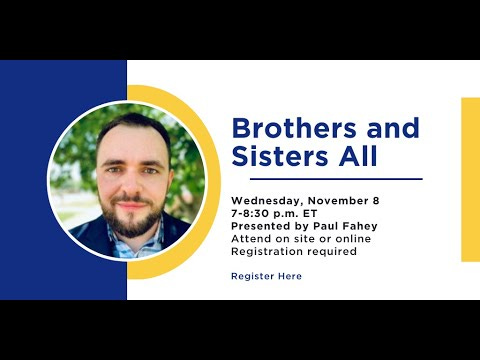Brothers and Sisters All
Last week Wednesday, November 8th, I gave a talk at the Catholic Information Center in Grand Rapids, MI titled, Brothers and Sisters All.
In 2020, Pope Francis released a new social encyclical, Fratelli Tutti, about human fraternity and social friendship. Three years later, this document is still prophetic for Christians trying to bring about God's Kingdom in a world marked by inequality, polarization, and a "throwaway culture."
This presentation contextualized Fratelli Tutti in the history of the Church's social teaching, laid out the major problems that the pope sees happening in the world, and presented the new paths of hope that Francis proposes in order to move forward.
You can watch the whole talk here!
Here are some key passages from Pope Francis that give a preview of what I discuss:
Some parts of our human family, it appears, can be readily sacrificed for the sake of others considered worthy of a carefree existence. Ultimately, “persons are no longer seen as a paramount value to be cared for and respected, especially when they are poor and disabled, ‘not yet useful’ – like the unborn, or ‘no longer needed’ – like the elderly. (FT 18)
Faith has untold power to inspire and sustain our respect for others, for believers come to know that God loves every man and woman with infinite love and “thereby confers infinite dignity” upon all humanity. We likewise believe that Christ shed his blood for each of us and that no one is beyond the scope of his universal love. (FT 85)
The Christian tradition has never recognized the right to private property as absolute or inviolable, and has stressed the social purpose of all forms of private property....The right to private property can only be considered a secondary natural right, derived from the principle of the universal destination of created goods…The right of some to free enterprise or market freedom cannot supersede the rights of peoples and the dignity of the poor, or, for that matter, respect for the natural environment, for if we make something our own, it is only to administer it for the good of all. (FT 120, 122)
No one, then, can remain excluded because of his or her place of birth, much less because of privileges enjoyed by others who were born in lands of greater opportunity. The limits and borders of individual states cannot stand in the way of this. As it is unacceptable that some have fewer rights by virtue of being women, it is likewise unacceptable that the mere place of one’s birth or residence should result in his or her possessing fewer opportunities for a developed and dignified life. (FT 121)
Every war leaves our world worse than it was before. War is a failure of politics and of humanity, a shameful capitulation, a stinging defeat before the forces of evil. Let us not remain mired in theoretical discussions, but touch the wounded flesh of the victims. Let us look once more at all those civilians whose killing was considered “collateral damage”. Let us ask the victims themselves. Let us think of the refugees and displaced, those who suffered the effects of atomic radiation or chemical attacks, the mothers who lost their children, and the boys and girls maimed or deprived of their childhood. Let us hear the true stories of these victims of violence, look at reality through their eyes, and listen with an open heart to the stories they tell. In this way, we will be able to grasp the abyss of evil at the heart of war. Nor will it trouble us to be deemed naive for choosing peace. (FT 261)
Today we state clearly that “the death penalty is inadmissible”and the Church is firmly committed to calling for its abolition worldwide….Let us keep in mind that “not even a murderer loses his personal dignity, and God himself pledges to guarantee this”.The firm rejection of the death penalty shows to what extent it is possible to recognize the inalienable dignity of every human being and to accept that he or she has a place in this universe. If I do not deny that dignity to the worst of criminals, I will not deny it to anyone. I will give everyone the possibility of sharing this planet with me, despite all our differences. (FT 263, 269)



